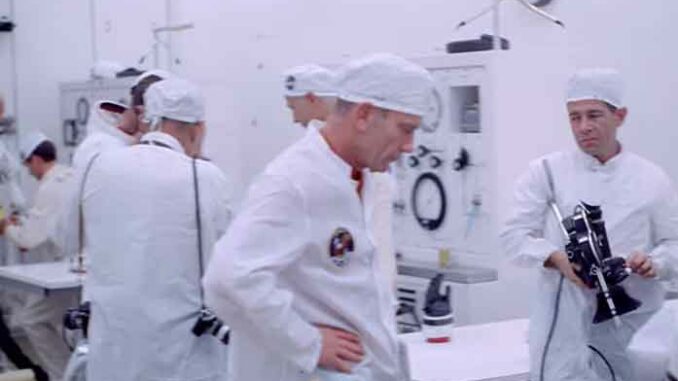
Director Todd Douglass Miller’s new film Apollo 11, currently at The Loft Cinema in Tucson, is breathtaking. Even for those who watched and listened 50 years ago when humans first set foot on the moon, the film is edge-of-your-seat gripping.
With new 65mm footage and a musical score that heightens the tension – even knowing the outcome – we find ourselves holding our breath or exclaiming in awe just as we did in 1969 when Neil Armstrong and Buzz Aldrin left their space module to set foot on the lunar surface while Michael Collins piloted the command module that would get them safely back to earth.
Miller shows us, with archival film and commentary from the day, what a huge team effort the moon landing was. It took hundreds at their stations dealing with thousands of tiny details for an incredibly complex feat of engineering and manufacture, of precision calculations and maneuvering, and of just plain guts, to make it happen. And for a few days the world held its breath and looked to the skies.
Only hinted at briefly as TV news was the bitterly divided state of the nation. The year before, 1968, saw cops and radicals killing each other; Chicago police breaking heads at the 1968 Democratic Convention; reformers like Rev. Martin Luther King Jr. and Robert Kennedy, and perceived establishment threats like Malcolm X, cut down by assassin’s bullets; urban ghettoes exploding in justified rage; the Weather Underground trying to manufacture rage with window-smashing and bombs.
African Americans – noticeably absent from the NASA work force – were still struggling to see the Civil Rights Acts implemented, and militant groups like the Black Panthers came under deadly police attacks. Women, also largely absent from the NASA teams, were uniting to challenge anti-abortion laws. Police attacks on patrons at the Stonewall Inn in New York launched the Gay Rights movement. Marches against the war in Vietnam were mobilizing hundreds of thousands of Americans to take to the streets in peaceful protest. Even pop music was polarized between Ballad of the Green Berets and Eve of Destruction.
But for a moment that July, all the division and anger was set aside as earthlings walked on the moon. It was, as Neil Armstrong said when he stepped off the spacecraft’s ladder onto the lunar surface, “One small step for man; one giant leap for mankind.” There are lessons in the Apollo 11 story for all of us 50 years later.
The commitment to put a human on the moon came from a Democratic president, John F. Kennedy, and was realized under a Republican, Richard M. Nixon. Thousands of people of all or no politics were involved in the project, and the success of the moon landing showed the world – and more importantly ourselves – that if we set our minds to it we can do the seemingly impossible. Working together, even in polarized and contentious times, we can do it. That is worth remembering.
